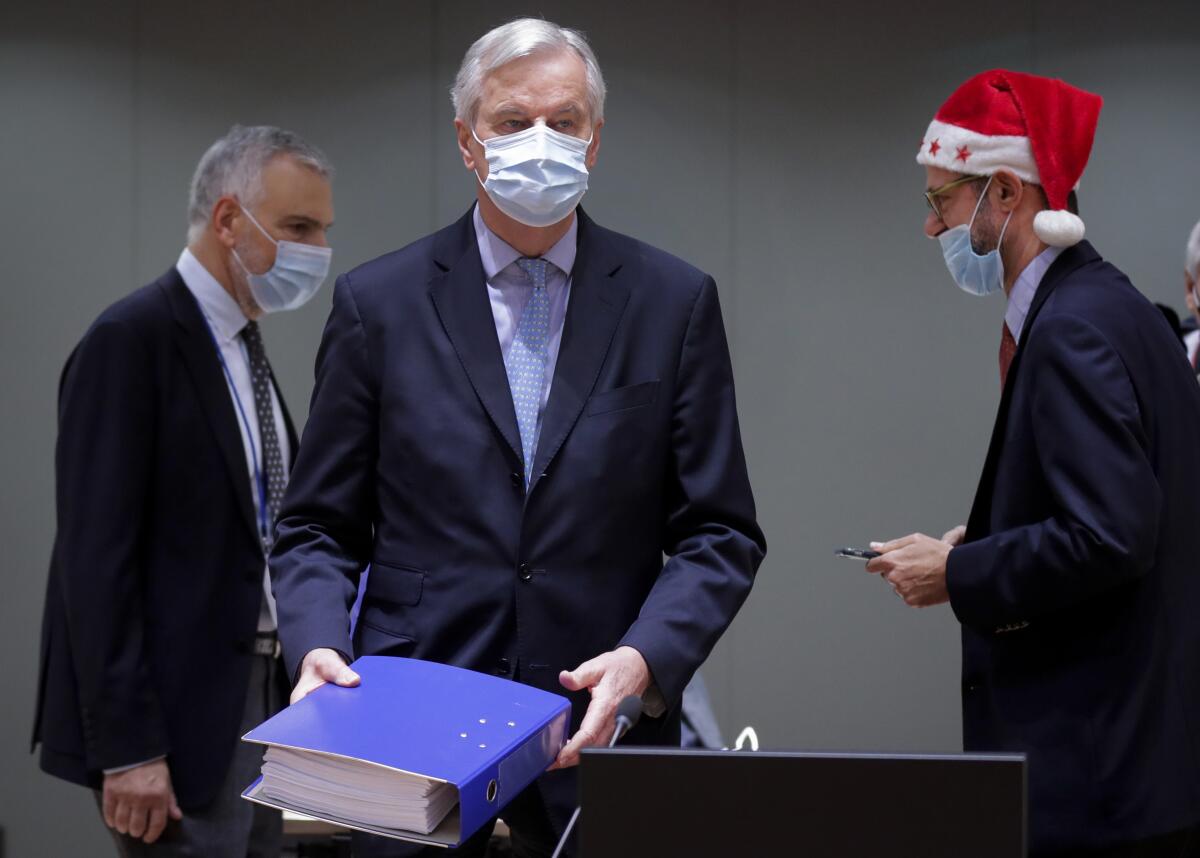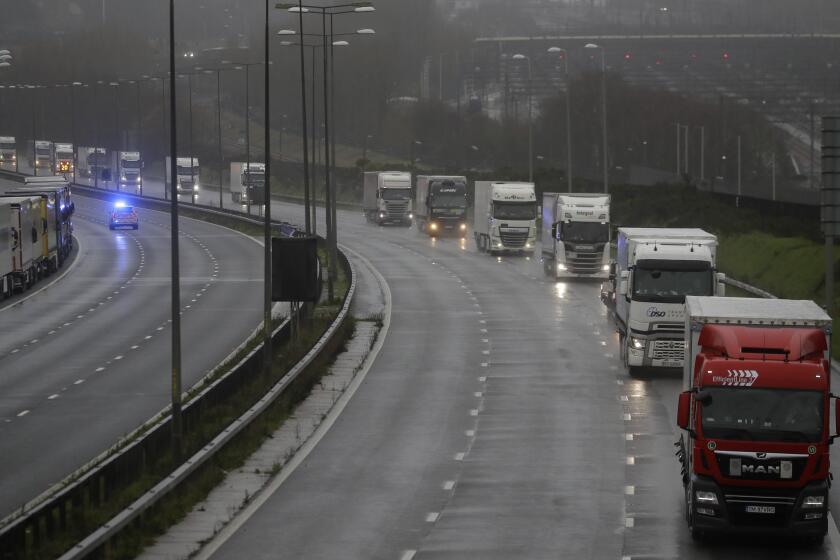Britain warns of ‘bumpy’ post-Brexit transition despite EU trade deal

- Share via
LONDON — First came the Brexit trade deal. Now comes the red tape and the institutional nitty-gritty.
Four days after sealing a free trade agreement with the European Union, the British government warned businesses Monday to get ready for disruptions and “bumpy moments” when the new rules take effect Thursday night.
Businesses are scrambling to digest the details and implications of the 1,240-page deal sealed by EU negotiators and the British government Christmas Eve. EU ambassadors gave their unanimous approval to the agreement Monday.
“Green light,” said German government spokesman Sebastian Fischer, whose country holds the rotating EU presidency.
The approval had been expected since all EU leaders warmly welcomed the deal last week. It still needs ratification by the EU’s legislature, which is expected in February, but will provisionally come into force on New Year’s Day. Britain’s Parliament is expected to approve the agreement Wednesday.
Britain formally left the EU almost a year ago but remained within the bloc’s economic embrace during a transition period that ends Thursday.
Brexiteers staked the country’s future on Boris Johnson, believing he could lead an exit from the European Union with benefits and no costs. It’s not turning out that way.
The agreement, hammered out after nine months of tense negotiations, will allow Britain and the 27-nation bloc to trade goods without tariffs or quotas. That should help protect the $894 billion in annual trade between the two sides and the hundreds of thousands of jobs that rely on it.
But the end to Britain’s membership in the EU’s vast single market and customs union will still bring inconvenience and new expenses for both individuals and businesses, such as the need for tourists to have travel insurance and the millions of new customs declarations that firms will have to fill out.
“Businesses will need to make sure that they’re ready for new customs procedures, and we as individuals will need to make sure that our passports are up to date because they need to have at least six months before expiry on them in order to be able to travel abroad,” said Michael Gove, the British Cabinet minister in charge of Brexit preparations.
“I’m sure there will be bumpy moments, but we are there in order to try to do everything we can to smooth the path,” he told the BBC.
In beleaguered Britain, Brexit is coming, Christmas is pretty much canceled and a new strain of the coronavirus brings near-pariah status. What next?
British Prime Minister Boris Johnson’s Conservative government argues that any short-term disruption from Brexit will be worth it, because the U.K. will now be free to set its own rules and strike new trade deals around the world.
An ominous preview of what could have lay in store if no British-EU deal was struck came when France briefly closed its border with Britain last week because of a highly contagious new coronavirus strain spreading throughout London and southern England. Thousands of freight trucks were stuck in traffic jams or parked at a disused airfield near the English Channel port of Dover for days, and supermarkets warned that some goods, including fresh produce, would soon run short.
Even after France relented and agreed to let in truckers who tested negative for the coronavirus, the backlog of 15,000 drivers who now needed tests took days to clear.
Hard-line pro-Brexit lawmakers in Johnson’s Conservative Party are poring over the trade agreement to see whether it meets their goal of a decisive break from the bloc. The opposition Labor Party says the deal will hurt Britain’s economy, but the party will vote in favor of it anyway to avoid an even worse “no-deal” scenario.
News Alerts
Get breaking news, investigations, analysis and more signature journalism from the Los Angeles Times in your inbox.
You may occasionally receive promotional content from the Los Angeles Times.
Uncertainty still hangs over huge areas of the relationship between Britain and the EU. The agreement covers trade in goods but leaves the U.K.’s huge financial services sector in limbo. Cooperation across the English Channel on matters of public security has still to be worked out.
And the Brexit deal has angered one of the sectors that had most supported an exit from the EU and that the government had stressed it would protect: fishing. The economically minor but hugely symbolic issue of fishing rights was a sticking point in negotiations, with maritime EU nations seeking to retain access to British waters and Britain insisting that it must control its seas.
Under the deal, the EU will give up a quarter of the quota it catches in British waters, far less than the 80% that Britain initially demanded. The system will be phased in over five and a half years, after which the quotas will be reassessed.
“I am angry, disappointed and betrayed,” said Andrew Locker, chairman of Britain’s National Federation of Fishermen’s Organizations. “Boris Johnson promised us the rights to all the fish that swim in our exclusive economic zone, and we have got a fraction of that.”
More to Read
Sign up for Essential California
The most important California stories and recommendations in your inbox every morning.
You may occasionally receive promotional content from the Los Angeles Times.












